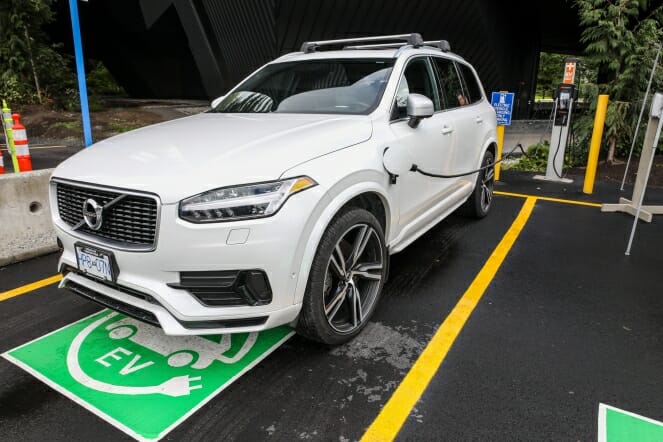Strategy steps aim to accelerate EV adoption by residents, commuters and businesses
Whistler Council adopted the Whistler Electric Vehicle Strategy at the June 7 meeting.
The Electric Vehicle (EV) Strategy provides a framework to align with Whistler’s Climate Action Big Moves Strategy and supports Big Move 2: Decarbonize passenger and commercial transport. Personal vehicle transportation is Whistler’s largest source of GHG emissions, accounting for 54 per cent of Whistler’s community-wide emissions in 2019 and 40 per cent in 2020, and is one of the main challenges to achieving our climate targets.
Increasing the use of EV vehicles will be key to achieving this goal, while also focusing on prioritizing active transportation, such as walking and cycling, and using transit.
The final Whistler EV Strategy is based on extensive research, internal and external stakeholder engagement, as well as public and focus group consultation. The actions identified in the EV Strategy aim to accelerate EV adoption for residents, the commuter workforce and businesses; and are organized into the following four focus areas and goals:
- Increase access to charging at home. The lack of access to home charging was identified by Whistler residents as the main barrier to EV adoption. The actions to achieve this goal are designed to enable more residents to charge at home, in both existing homes and in new construction.
- Expand the public charging network. Whistler’s visitors and commuters need access to public EV charging. In addition, Whistler residents without access to home charging rely on the available public charging network. Whistler is expecting significant growth in EV charging demand between now and 2030 based on modelling projections and the light-duty Zero Emission Vehicle (ZEV) sales targets stated in the Province of British Columbia’s 2019 Zero Emission Vehicle Act.
- Accelerating electrification of municipal and commercial fleets. The RMOW can demonstrate leadership by being an early adopter of fleet electrification, and encourage other fleet operators to do the same.
- Accelerate individual adoption of EVs. Increasing awareness through outreach and education, advocating for continued EV incentive programs, tracking, and reporting on relevant metrics will promote this goal.
In addition, the EV Strategy considers accessibility needs, with input from the RMOW Accessibility Coordinator, and research on accessibility design of EV charging stations.
“This EV Strategy will support decarbonizing transportation in cases where a vehicle is necessary or desired,” said Mayor Jack Crompton. “While Whistler has an incredible Valley Trail network that makes walking, cycling, or skateboarding a pleasure, not every trip can be made by active transportation or transit within Whistler. This strategy is our roadmap to making it possible for more individuals and businesses to choose an EV as their next vehicle.”
Seven performance indicators will monitor the implementation progress of the four focus areas, ranging from counting the number of publicly available EV chargers, utilization and availability of chargers and continued monitoring of Greenhouse Gas emissions from passenger vehicles.
The Strategy was prepared by the Community Energy Association and was developed with engagement through a survey and with stakeholders. The survey launched by the RMOW and Tourism Whistler received a total of 1,440 responses from residents, commuters and visitors. The strategy development was funded with support from the EMOTIVE Clean Transportation Targets and Planning Pilot Funding Program (CTTP) grant.
The following stakeholders informed the Strategy: Tourism Whistler, Whistler Blackcomb, Whistler Housing Authority, Whistler Hotel Association, Nineteen Mile Creek Strata Council Representative, WCS Engagement and Planning, Spinal Cord Injury BC, RMOW Accessibility Coordinator.
For more information, visit whistler.ca/EV.

